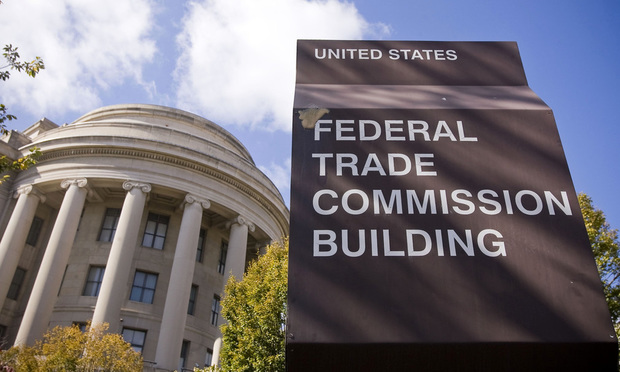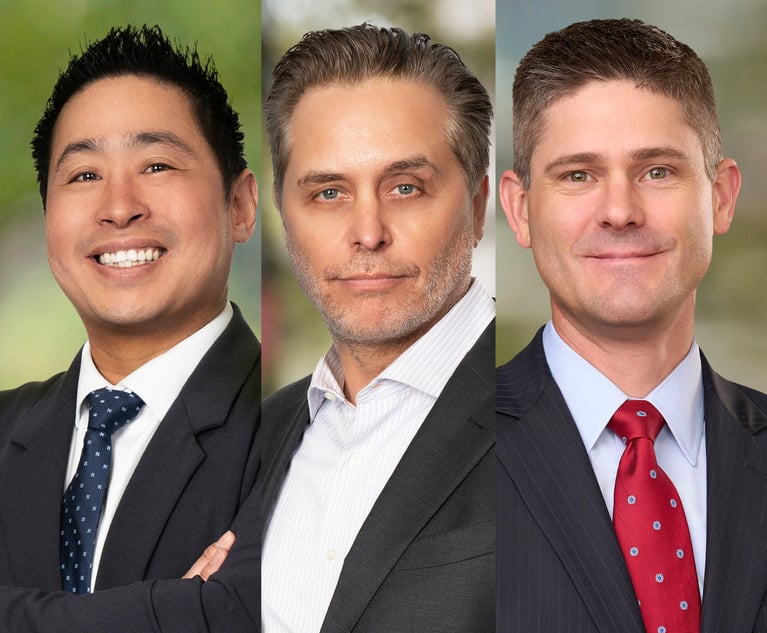In Expanded Uber Settlement, FTC Hammers Home Security Message
The regulator warned tech companies to make sure their software development environments are secure. Uber's 2016 breach came after an engineer stored an access key to a cloud database in code hosted on GitHub.
April 12, 2018 at 06:18 PM
3 minute read

The Federal Trade Commission on Thursday announced an expanded settlement with Uber to address the data breach disclosed by the ride-hailing giant in November, and took the opportunity to urge tech companies to lock down their software development environments.
The new FTC consent order comes after Uber agreed in August to submit to regular audits of its privacy protocols to resolve FTC allegations the company failed to properly safeguard sensitive data. Those allegations had to do with a 2014 data breach that resulted from unsecured data stored on an Amazon Web Services S3 cloud server.
“After misleading consumers about its privacy and security practices, Uber compounded its misconduct by failing to inform the commission that it suffered another data breach in 2016 while the commission was investigating the company's strikingly similar 2014 breach,” acting FTC Chairman Maureen K. Ohlhausen said in a statement.
“The strengthened provisions of the expanded settlement are designed to ensure that Uber does not engage in similar misconduct in the future,” she added. According to the FTC, Uber could be subject to civil penalties for failing to report future breaches under the settlement. Uber is not currently directed to pay any monetary penalty under either consent order.
“My first week at Uber was the week we disclosed the 2016 breach. When Dara Khosrowshahi joined the company, he committed on behalf of every Uber employee that we would learn from our mistakes, change the way we did business and put integrity at the core of every decision we made,” Uber chief legal officer Tony West said in a statement. “Since then we have moved quickly to do just that by taking responsibility for what happened.”
The FTC's chief technologist, Neil Chilson, also posted a blog on Thursday titled “A Lesson from Uber: Secure Your Non-Production Software Environments,” issuing a broader warning to tech companies about how they handle data when collaborating on code.
According to the FTC's complaint, intruders gained access to an Amazon S3 Datastore used by Uber after obtaining an access key an Uber software engineer posted to GitHub, a platform for software collaboration. The key was stored in plain text in a private code repository, but the attackers were able to access it by breaking into GitHub accounts used by Uber engineers. Uber paid the hackers $100,000 to keep the breach quiet.
“Companies often focus their privacy and data security efforts on the up-and-running production environments actively used by their consumers,” Chilson wrote. “But an insecure software development environment can also create real problems. Insecure non-production environments leave a company open to corporate espionage, sabotage by competitors, and, yes, theft of private consumer data.”
Chilson urged companies to “consider privacy and data security in all phases of the software lifecycle.” Specifically, he advised companies to be cautious when submitting code to public or open-source repositories.
“Review it for security vulnerabilities, especially hardcoded keys and logins. Not only does this protect you, your employer, and your customers, it also improves the quality of the code for the community,” he added.
This content has been archived. It is available through our partners, LexisNexis® and Bloomberg Law.
To view this content, please continue to their sites.
Not a Lexis Subscriber?
Subscribe Now
Not a Bloomberg Law Subscriber?
Subscribe Now
NOT FOR REPRINT
© 2025 ALM Global, LLC, All Rights Reserved. Request academic re-use from www.copyright.com. All other uses, submit a request to [email protected]. For more information visit Asset & Logo Licensing.
You Might Like
View All
White & Case KOs Claims Against Voltage LLC in Solar Companies' Trade Dispute

Goodwin Procter Relocates to Renewable-Powered Office in San Francisco’s Financial District

Polsinelli Picks Up Corporate Health Care Partner From Greenberg Traurig in LA

Perkins Coie Lures Former Longtime Wilson Sonsini Tech Transactions Partner
Trending Stories
- 1Decision of the Day: Judge Dismisses Defamation Suit by New York Philharmonic Oboist Accused of Sexual Misconduct
- 2California Court Denies Apple's Motion to Strike Allegations in Gender Bias Class Action
- 3US DOJ Threatens to Prosecute Local Officials Who Don't Aid Immigration Enforcement
- 4Kirkland Is Entering a New Market. Will Its Rates Get a Warm Welcome?
- 5African Law Firm Investigated Over ‘AI-Generated’ Case References
Who Got The Work
J. Brugh Lower of Gibbons has entered an appearance for industrial equipment supplier Devco Corporation in a pending trademark infringement lawsuit. The suit, accusing the defendant of selling knock-off Graco products, was filed Dec. 18 in New Jersey District Court by Rivkin Radler on behalf of Graco Inc. and Graco Minnesota. The case, assigned to U.S. District Judge Zahid N. Quraishi, is 3:24-cv-11294, Graco Inc. et al v. Devco Corporation.
Who Got The Work
Rebecca Maller-Stein and Kent A. Yalowitz of Arnold & Porter Kaye Scholer have entered their appearances for Hanaco Venture Capital and its executives, Lior Prosor and David Frankel, in a pending securities lawsuit. The action, filed on Dec. 24 in New York Southern District Court by Zell, Aron & Co. on behalf of Goldeneye Advisors, accuses the defendants of negligently and fraudulently managing the plaintiff's $1 million investment. The case, assigned to U.S. District Judge Vernon S. Broderick, is 1:24-cv-09918, Goldeneye Advisors, LLC v. Hanaco Venture Capital, Ltd. et al.
Who Got The Work
Attorneys from A&O Shearman has stepped in as defense counsel for Toronto-Dominion Bank and other defendants in a pending securities class action. The suit, filed Dec. 11 in New York Southern District Court by Bleichmar Fonti & Auld, accuses the defendants of concealing the bank's 'pervasive' deficiencies in regards to its compliance with the Bank Secrecy Act and the quality of its anti-money laundering controls. The case, assigned to U.S. District Judge Arun Subramanian, is 1:24-cv-09445, Gonzalez v. The Toronto-Dominion Bank et al.
Who Got The Work
Crown Castle International, a Pennsylvania company providing shared communications infrastructure, has turned to Luke D. Wolf of Gordon Rees Scully Mansukhani to fend off a pending breach-of-contract lawsuit. The court action, filed Nov. 25 in Michigan Eastern District Court by Hooper Hathaway PC on behalf of The Town Residences LLC, accuses Crown Castle of failing to transfer approximately $30,000 in utility payments from T-Mobile in breach of a roof-top lease and assignment agreement. The case, assigned to U.S. District Judge Susan K. Declercq, is 2:24-cv-13131, The Town Residences LLC v. T-Mobile US, Inc. et al.
Who Got The Work
Wilfred P. Coronato and Daniel M. Schwartz of McCarter & English have stepped in as defense counsel to Electrolux Home Products Inc. in a pending product liability lawsuit. The court action, filed Nov. 26 in New York Eastern District Court by Poulos Lopiccolo PC and Nagel Rice LLP on behalf of David Stern, alleges that the defendant's refrigerators’ drawers and shelving repeatedly break and fall apart within months after purchase. The case, assigned to U.S. District Judge Joan M. Azrack, is 2:24-cv-08204, Stern v. Electrolux Home Products, Inc.
Featured Firms
Law Offices of Gary Martin Hays & Associates, P.C.
(470) 294-1674
Law Offices of Mark E. Salomone
(857) 444-6468
Smith & Hassler
(713) 739-1250






